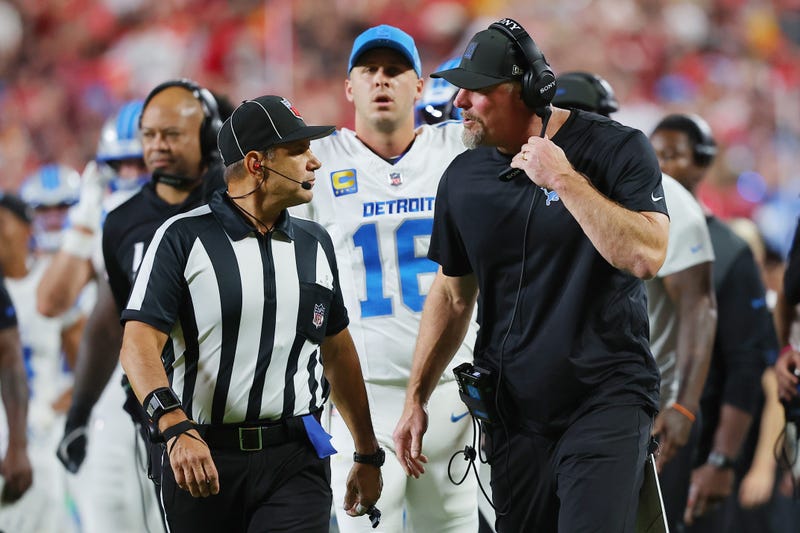
The Lions are at the center of another officiating controversy in the NFL. It appears the league overstepped its boundaries in helping the referees make a call that overturned a Lions' touchdown in Detroit's loss in Kansas City last Sunday night.
After the officials huddled up on the field and wiped out a touchdown pass in the first quarter from David Montgomery to Jared Goff by throwing a flag on Goff for illegal motion well more than a minute after the touchdown occurred, head official Craig Wrolstad conferred with Campbell on the sideline to explain the call.
Campbell told reporters after the game that the call came down from the NFL's replay center in New York. That would be against league protocol, as the call in question wasn't subject to replay review.
Head official Craig Wrolstad denied as much during this exchange with a pool reporter after the Chiefs' 30-17 win:
Question: What kind of help or assistance, if any, did you have from the replay assistant in Kansas City or from New York?
Wrolstad: "We did not have any assistance from Kansas City or New York."
Question: So that was just a discussion amongst the crew itself?
Wrolstad: "That’s right."
In his weekly interview Wednesday on 97.1 The Ticket, Campbell was asked if he was explicitly told that the call came down from New York and replied, "Yes." Asked later if it was an official who told him that, he replied, "Yep."
It's possible that there was a miscommunication between Campbell and Wrolstad in a loud, chaotic environment, or that another official relayed incorrect information to Campbell about the discussion on the field, but Campbell spoke directly with Wrolstad after Wrolstad threw the flag and announced the call. Either way, the situation raises lots of questions.
And the Lions want answers. They have submitted the episode to the NFL to inquire why Campbell was told that the call came from New York only for Wrolstad to say otherwise after the game, why it took the refs so long to amend the call, and what exactly happened in that space of time that led to the flag.
"We asked on all of that," said Campbell. "We asked on all of it. And I can’t tell you any of that."
Goff echoed Campbell on Wednesday on 97.1 The Ticket when asked about the refs and the play in question: "I know he talked about it this morning and what he said is what they told me, too. They were told from somebody that it was illegal, from either upstairs or elsewhere. And that’s the last I’ll say about it."
The touchdown was overturned, Wrolstad said after the game, because Goff approached the center before the snap, "paused momentarily in the quarterback position," and never came to a stop after going in motion, thus failing to disengage from the quarterback position and establish himself as a receiver.
Goff was under the impression that as long as he didn't place his hands under center -- which he didn't -- he was not declared as the quarterback. He said it was his first time hearing "a new version" of the rule -- "and if that is the rule, I guess we need to do a little more research on that," he said.
"Essentially it's an illegal formation that they're calling from the booth, which I've never heard of," said Goff. "But that's not the difference in the game. It was a cool play that would've been fun to score on and it would've been nice to get a touchdown there, but I don't think that by any means would have flipped the game. There was a ton of other plays that they made that we didn't."
The NFL rulebook states "it is legal for a T-Formation Quarterback to go in motion, whether he has placed his hands under center, on his knees, or on the body of the center. However, it is a false start if the action is quick and abrupt. If the player fails to come to a complete stop for at least one full second prior to the ball being snapped, it is illegal motion."
Even if the referees interpreted the rule correctly, they should not had have assistance from the NFL's officiating arm in New York. Here's what Wrolstad said about the discussion on the field that eventually led to the overturned call:
"It’s my job to see if the quarterback stopped initially. The down judge watches the player in motion, and we had to communicate between him, my umpire, and my line judge whether or not he initially stopped at the quarterback position and then whether he stopped after he went in motion out of my view toward the left-hand side of the field. There was a little bit of confusion in our discussion whether he had stopped initially or whether he had stopped at the end and what we were talking about. That’s why the flag came in so late."
Campbell took the high road when asked about the situation on Tuesday, calling it a "real sore spot" but taking accountability for the penalty on Goff.
"I told the team, man, I take full responsibility for that," he said. "I do. Players did exactly what we told them to do, Goff did exactly what we told him to do, David did, and I will take that. You have to make it very clear on where you are, and I did not do that. And I told them I take responsibility for that."
Still, the NFL has some explaining to do.
